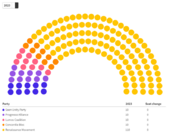Senate of Saen
The Senatos (Spanish: Senato) is the upper house of the Council of Minister, which together with the House of Delegates – the lower chamber – constitutes the Parliament of the Kingdom of Saen. The Senatos convenes in the Senate Palace in Azuria.
The composition of the Senatos is outlined in Part III of the Saenese Constitution. Each senator represents a province, an autonomous city, or an autonomous region. Each mainland province, regardless of its population size, is equally represented by four senators. In the insular provinces, the larger islands are represented by three senators, while the smaller islands have one senator each. Similarly, the autonomous cities of Ceuta and Melilla each elect two senators. This direct election leads to the selection of 150 senators by the populace. Additionally, the regional assemblies appoint their own representatives, with one senator representing each autonomous region and an extra senator for every million inhabitants, resulting in a total of 150 additional senators.
The Saenese Senatos is constitutionally designated as a territorial chamber. Its authority is akin to that of the House of Delegates. However, owing to its role as a territorial chamber, it possesses special powers, such as granting the Government of the Nation the authority to impose direct rule on a region or to dissolve municipal councils. The presiding officer of the Senatos is the Senate President, who is elected by its members.
History
The history of the Senate of Saen is a narrative of political evolution, institutional development, and the pursuit of representative governance within the kingdom. From its inception to its contemporary role, the Senate has played a crucial role in shaping Saenese society and politics.
Early Establishment: The origins of the Senate of Saen can be traced back to the kingdom's transition from monarchical rule to a more inclusive and representative form of government. In the wake of social and political upheaval, the monarchy recognized the need for a legislative body that could provide oversight, debate legislation, and represent the interests of the kingdom's diverse regions and communities.
Founding Principles: Established on the principles of democratic representation and territorial balance, the Senate was envisioned as a forum where senators could deliberate on matters of national importance and advocate for the needs and concerns of their constituents. Its composition reflected Saen's commitment to regional autonomy and proportional representation, with senators elected from each province, autonomous city, and autonomous community.
Evolution and Expansion: Over the years, the Senate underwent various reforms and expansions to adapt to changing political dynamics and societal needs. Amendments to electoral laws, changes in senatorial appointment processes, and the inclusion of additional representatives from newly established regions contributed to the Senate's evolution as a more inclusive and representative institution.
Challenges and Reforms: The Senate of Saen has faced its share of challenges throughout its history, including periods of political deadlock, corruption scandals, and debates over constitutional amendments. However, these challenges have often served as catalysts for reform, prompting the Senate to strengthen its oversight mechanisms, enhance transparency, and reaffirm its commitment to democratic values.
Modern Role and Responsibilities: Today, the Senate of Saen serves as a vital component of the kingdom's legislative process, alongside the Chamber of Deputies. It plays a critical role in reviewing and amending legislation, scrutinizing government policies, and representing the interests of Saenese citizens at the national level. The Senate's committees and working groups address a wide range of issues, from economic development and social welfare to environmental protection and foreign affairs.
As Saen continues to navigate the complexities of the modern world, the Senate remains a cornerstone of the kingdom's democratic institutions, upholding the principles of accountability, transparency, and public participation in governance. Its history reflects the ongoing struggle to balance competing interests, uphold democratic norms, and serve the common good of the Saenese people.

